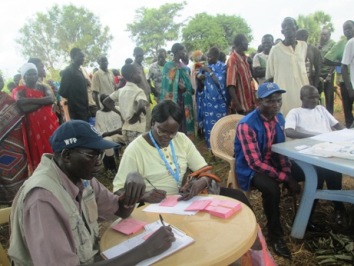UN warns of “catastrophe” in war-torn South Sudan
October 22, 2015 (JUBA) – Three United Nations agencies have warned that extreme hunger could push people to the brink of a catastrophe in parts of war-torn South Sudan.

The UN Food and Agriculture Organization (FAO), the UN Children’s Fund (UNICEF) and the World Food Programme (WFP) called on the parties to the conflict to grant urgent and unrestricted access to Unity State, where a newly released Integrated Food Security Phase Classification (IPC) analysis shows that at least 30, 000 people are living in extreme conditions and face starvation and death.
“This is the start of the harvest and we should be seeing a significant improvement in the food security situation across the country, but unfortunately this is not the case in places like southern Unity State, where people are on the edge of a catastrophe that can be prevented,” said WFP country director Joyce Luma.
“The people of South Sudan need peace, nutritious food and other humanitarian assistance and livelihood support to survive and rebuild their lives,” she added.
According to the UN, unless unrestricted humanitarian access is urgently granted, food insecurity could deteriorate to famine in parts of Unity State, where humanitarian assistance has been hampered by violence and lack of access to areas in recent months.
Some displaced families are reportedly surviving on just one meal a day “consisting of only fish and water lilies”.
“Since fighting broke out nearly two years ago, children have been plagued by conflict, disease, fear and hunger,” said Jonathan Veitch, UNICEF representative in South Sudan.
“Their families have been extraordinary in trying to sustain them, but have now exhausted all coping mechanisms. Agencies can support, but only if we have unrestricted access. If we do not, many children may die,” he added.
Throughout the country, the IPC analysis reportedly indicates that 3.9 million people in South Sudan face severe hunger. Although the number of food insecure households has decreased – as expected – during the harvest season, it is almost 80 percent higher than in the same period last year, as even people living in states not directly affected by the conflict struggle with its long-term effects, erratic rainfall, depleted livelihood options, high food prices, fuel costs and inflation, in a generally degraded economic environment.
The IPC reports also shows that the overall nutrition situation remains critical, with Global Acute Malnutrition (GAM) among children under five, which is said to be above the emergency threshold in the conflict-affected states of Jonglei, Upper Nile and Unity in September, and high in Northern Bahr el Ghazal and Warrap throughout the year.
The high prevalence is attributed to inadequate food consumption, poor maternal and child feeding practices, illnesses and limited delivery of health and nutrition services.
The agencies warned that the dire economic situation in the young nation contributed to record-high food prices that significantly affect families’ purchasing power and worsening levels of food insecurity. Also likely to be hit are other parts of the country.
“Livelihoods have been severely affected by high inflation rates, market disruption, conflict-related displacement, and loss of livestock and agricultural production,” said Serge Tissot, the head of FAO in South Sudan.
“In addition, looking forward to the completion of the 2015 cropping season by the end of the year, a below average cereal production is expected in Uganda the Sudan and Ethiopia, which will further aggravate the food import bill in South Sudan. By creating ways to support crop, livestock and fish producers the resilience of these communities will be strengthened,” he added.
(ST).
